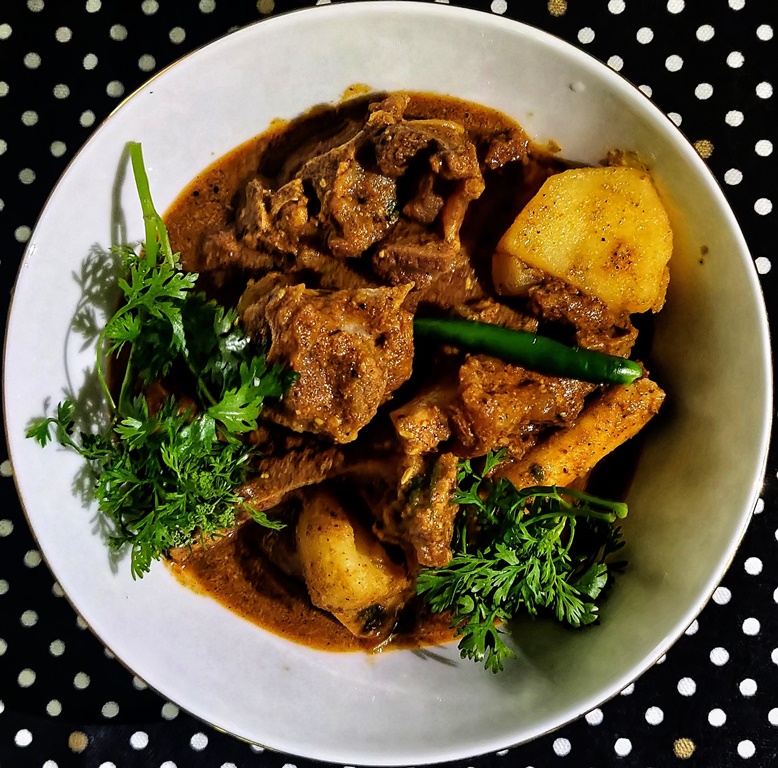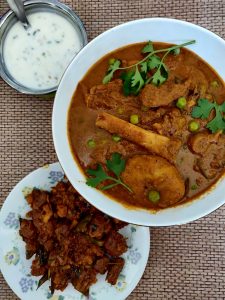
Mutton Curry With Potatoes And Green Peas
Mutton Curry with Potatoes and green peas is my Mother's Special Mutton Curry recipe. It is one of the most treasured and mouth-watering recipes she has passed on to me. During my growing-up years, she would prepare this delicious mutton curry on Sundays for lunch, and the family looked forward to relishing it week after week. This is one of the first recipes I learned, and I have been cooking it for years since. I have been asked for this recipe by my friends and acquaintances, and I have gladly shared it with them. This fragrant, tender, soft mutton curry has a fine balance of pepper, coriander seeds, fennel seeds, cloves, cinnamon, cardamom, and nutmeg. It includes herbs like coriander leaves, curry leaves, ginger, and garlic. The mutton curry is mildly spiced, but if you prefer it spicier, you can add more black pepper and green chillies to it. There can be many variations to this curry depending on the availability of spices in your pantry. Potatoes in Mutton CurryDid you know that potatoes and mutton are a match made in heaven? They are such a perfect combination! I cook the potatoes separately and add them to the curry at the final stages of cooking. This is to prevent the potatoes from getting overcooked. You can add some greens to the mutton curry and make it more wholesome. I add some fresh green peas whenever they are in season, and the mutton curry tastes heavenly. So, here you have a fine balance of meat and greens in your diet.Marinating the muttonFor a mutton curry to taste flavourful and succulent, the marination process is vital. Marinating the mutton pieces with turmeric, chilli powder, curd, and refrigerating them is an important step. It helps the marinated meat to absorb the spices well. (You can omit the curd if the mutton is very tender.)Then comes the cooking time. A well-cooked mutton curry can enhance and bring out its unique flavour and taste. By well-cooked, I mean it should neither be overcooked nor undercooked.This is an easy-to-cook mutton curry recipe because I use the pressure cooker. This way, one can save a lot of time and attend to other chores in the house while the mutton curry is getting cooked!Cooking oilThis mutton curry can be cooked in the oil of your choice. I cook it in sunflower oil. You can use mustard oil or olive oil. In some parts of India, mutton curry is cooked in mustard oil, and I must say that it tastes lip-smacking!Tender meatI prefer to buy tender mutton or lamb as it doesn't contain fat, and it is considered a healthier option. It cooks faster and it's juicier.The tender mutton curry can also be slow-cooked in a cooking pot or pan if you have sufficient time. As curd is a tenderizer, it cooks faster when marinated with it.
Equipment
- 1 Pressure Cooker
- 1 Deep seasoning pan
- 1 ladle
Ingredients
- 1 kg Tender mutton (with bones)
- 4 nos. Potatoes (deskinned & cubed)
- 3 nos. Tomatoes (large, chopped)
- 2 cups Green peas (optional)
For Roasting And Grinding
- ½ no. Coconut (grated)
- 2 tsps Whole pepper
- 2 tsps Fennel seeds
- 4 nos. Cloves
- 3 nos. Cinnamon
- 3 nos. Cardamom
- ½ no. Nutmeg (half)
- 2 tsps Coriander seeds/coriander powder
For Marination
- ½ tsp Turmeric powder
- 2 tsps Chilli powder
- 2 tsps Mutton/meat masala
- ½ cup Curd
- 1 tsp Salt or as per taste
For Seasoning
- 1 tbsp Sunflower oil
- ½ tsp Mustard seeds
- 10 nos. Curry leaves
- 1 no. Large onion (finely chopped)
- 8 nos. Garlic (chopped)
- 1 tbsp Ginger (thinly sliced)
- 4 nos. Green chillies
For Garnishing
- 2 tbsps Coriander leaves (chopped)
Instructions
How to prepare mutton curry
- Wash the mutton well and cut into small pieces. Marinate the mutton pieces with turmeric powder, chilli powder, salt, mutton masala, and curd.Keep aside for 45 minutes or refrigerate the marinated meat for at least 1 hour.
- Wash and peel potatoes. Cut them and boil separately in another container with salt and keep aside.It can also be pressure-cooked to save time. Peel off skin when cool.
Preparation of masala for the curry
- First, grate half a coconut. In a frying pan, heat 1 teaspoon of oil and add grated coconut, clove, cinnamon, cardamom, nutmeg, fennel seeds, whole pepper, and coriander seeds. Fry till light golden brown. Switch off the stove and let the ingredients cool down.Transfer the spices into a mixer grinder and grind them along with the chopped tomatoes into a fine paste by pouring a little water. Add more water if required.
Pressure cook the mutton
- In a pressure cooker, heat oil and splutter mustard seeds. Add a few curry leaves, stir, and then put in finely chopped onions. Fry till the onions are translucent. Add chopped garlic, ginger, green chillies, and cook for 5 minutes on medium flame.
- Add the marinated mutton and stir on a high flame for 5 minutes. Lower the flame and pour the ground coconut spice masala paste over the mutton. Add 2 cups of hot water and check if the salt is sufficient.Mix well and close the cooker with the lid. Cook till steam comes out of the cooker nozzle. Next, place the whistle on it and cook for 15 minutes (approximately 10 whistles). Cooking time depends on the tenderness of the mutton. If the mutton is very tender, 10 minutes is sufficient.
- After the mutton is cooked, add the boiled potatoes to the curry and slow-cook the mutton for five minutes. Lastly, add coriander leaves and mix well.
- Note: For those who love green peas, pop in some boiled fresh green peas. They are nutritious and tasty. ½ to 1 cup of peas is sufficient. It doesn't alter the taste of the mutton.This recipe can also be used to make semi-dry mutton curry or even mutton roast by reducing the water in the gravy.
- Serve the mutton curry with steaming hot rice and ginger curd.

What is ginger curd
- The recipe is simple: Chop a medium-sized ginger into small pieces, chop 2 green chillies. Gently pound the ginger pieces in a mortar and pestle to release the juices.In a bowl of curd, add the chopped ginger pieces, green chillies, and salt. Mix well. This is a great accompaniment for the mutton curry! My mother accidentally created this side dish. As she had some extra pieces of ginger left, she mixed it up with curd and the green chillies. The result was amazing!

Notes
FAQs
Can I cook mutton in a pan instead of a pressure cooker?
If you have enough time, try to slow-cook the mutton in a deep pan. This will retain its juiciness and flavour. If the mutton is tender, it can be slow-cooked.
Can I use cold storage mutton?
Always try to buy fresh mutton from the market. Cold storage ones need more time to cook. It is also less juicy than fresh mutton. If you have access to only the cold storage mutton, then thaw it, bring it back to room temperature, and marinate it well.
Should I discard the water from the potatoes after cooking them separately?
When the potatoes are cooked separately, do not discard the water unless you want a semi-dry consistency for the mutton curry. Do wash the potatoes well before boiling. If the potatoes have mud, wash them before peeling. Steam them in the cooker with water and 1 teaspoon salt.
Should I cook the green peas separately?
Green peas should not be cooked in the cooker as they cook faster. It can be cooked in a small pan with salt and added to the mutton curry. Green peas enhance the taste of the curry. It blends well with the mutton and potatoes. Use 1 cup of green peas.
What can I pair with the mutton curry?
The mutton curry can be paired with rice, hot chapatis, or puris. It can also be paired with appams and dosas. They taste delicious!